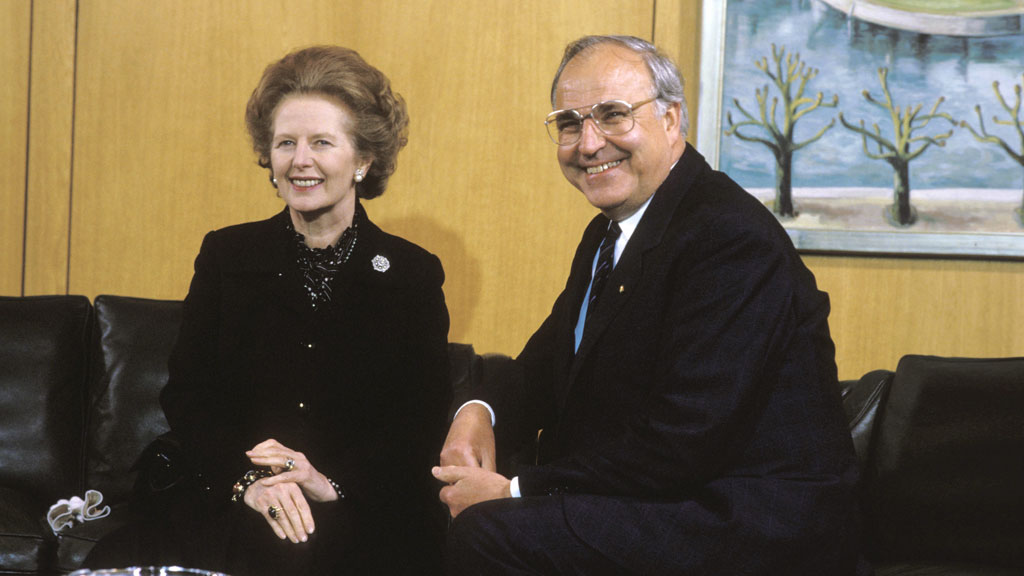David and Angela: Helmut and Margaret revisited?
As David Cameron and Angela Merkel meet for talks, the prime minister and German chancellor will be striving for warmer relations than their predecessors Margaret Thatcher and Helmut Kohl.

Baroness Thatcher’s famously testy relationship with Mr Kohl in the 1980s (despite appearances above) has come under the spotlight this week following her death.
During their long premierships – three terms in her case, four in his – they clashed regularly over their competing visions for the European Union. He believed in closer integration; she wanted a Europe of nation states.
In an interview with the Times yesterday, he said bluntly that “despite the best efforts of both sides, Margaret Thatcher and I simply never managed to build a trusting and warm relationship”.
He added: “Margaret Thatcher wanted Europe, but a different Europe from that wanted by most of her European colleagues and by me. From our point of view, this antagonism characterises British policy on Europe to this day.”
Mr Kohl went further in the second volume of his memoirs, published in 2005. His account reveals that Baroness Thatcher lost her temper during their discussions.
‘Gave me headaches’
“Margaret Thatcher always gave me headaches. Above all, during the process of German reunification in 1989, she played an unfriendly, dangerous role.
“To have her as an opponent is very, very unpleasant. And the opposition doesn’t end in the evening; it continues again in the morning.”
Asked to sum up their relationship, Britain’s former ambassador to Germany, Sir Christopher Mallaby, told Der Spiegel in 2009: “Very bad. It was a question of personal chemistry. They didn’t naturally enjoy each other’s company.”
The irony is that Baroness Thatcher and Mr Kohl both hailed from the political centre-right, like Mr Cameron and Mrs Merkel – yet she found it easier to deal with France’s socialist president Francois Mitterand.
The centre-left in Britain and Germany grew close when Tony Blair and Gerhard Schroeder were at the helm. In 1999, they wrote a joint paper on the way forward for European social democracy… before parting company over the Iraq war.

Mr Cameron and Mrs Merkel are said to enjoy good personal relations.
At the G8 summit at Camp David last year, he was pictured (see above) hugging her after watching Chelsea beat Bayern Munich in the penalty shoot-out of the Champions League final.
Moments earlier, he had punched the air in celebration. Had he been watching England defeat Germany, this reaction would have understandable in the eyes of English football fans. Doing so after watching an English team he does not support (he is an Aston Villa fan) gave the impression he was trying a little too hard.
Despite the bonhomie, Mrs Merkel’s patience with the Conservative leader over his plans to hold a referendum on British membership of the EU appears to be be wearing thin at times.
He wants her backing for a reformed EU, with concessions for Britain he can put to the electorate in a referendum after the next election.
She is sympathetic to some of his concerns about an EU he believes is meddling in areas it should be avoiding, but Mrs Merkel does not want to see the union unravel to accommodate him.
Charm offensive
The fact he has been invited – along with wife Samantha and their three children – to join Mrs Merkel and her husband at the German government’s sumptous manor house outside Berlin is part of a charm offensive designed to show she is prepared to listen.
He must be hoping for a better result than when Helmut Kohl entertained Margaret Thatcher at his summer retreat in Wolfgangsee. He was so exasperated, he ended the discussions by saying he had urgent business in Bonn. Shortly afterwards, she spotted him in a cafe eating cake.
The difference between Mr Cameron and Baroness Thatcher is that she was viewed as a pro-European during much of her political career, only becoming a sceptic in her later days. In contrast, Mr Cameron happily calls himself a Eurosceptic.
Unlike Baroness Thatcher, Mr Cameron is not the type to lose his temper if there are disagreements. But for the sake of British-German diplomatic relations, it would surely be better if he does not tell her to “Beruhig Dich Meine Liebe” (calm down, dear) if she raises her voice.
Those with knowledge of the hospitality he might expect from Mrs Merkel say the real test will be whether she cooks him pickled herring for breakfast.
-
Latest news
-
Laughing Boy: New play tells the tragic tale of Connor Sparrowhawk5m

-
Sewage warning system allows some of worst test results to be left off rating system, analysis shows3m

-
Post Office inquiry: Former CEO didn’t like word “bugs” to refer to faulty IT system4m

-
Israeli soldier speaks out on war in Gaza12m

-
PM’s defence spending boost should be ‘celebrated’, says former Armed Forces Minister4m

-




